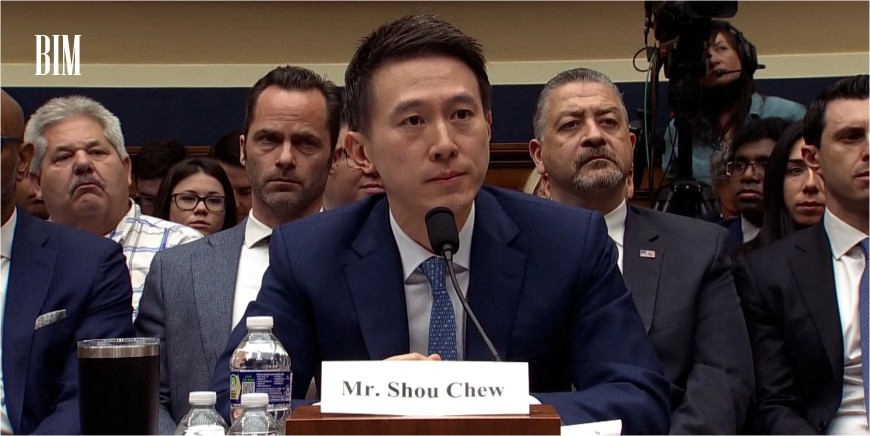Five crucial moments in TikTok CEO Shou Zi Chew’s Congress confrontation
bruising, harming, and unrelenting. Shou Zi Chew, the CEO of TikTok, was grilled by congressional investigators for four and a half hours on Thursday.
Other individuals can run marathons faster than that, as one legislator noted.
After a difficult time delivering testimony, Mr. Chew will undoubtedly be feeling it. Numerous tech executives have testified before Congress, and they frequently face opposition.
The relentless, merciless line of inquiry during this session, however, was outstanding.
There was no letup from either the Republicans or the Democrats.
Thereafter, a TikTok spokeswoman said that the politicians were “grandstanding.” Certainly, there is some truth to it.
Yet despite the somewhat annoyingly verbose questioning, we did pick up a few new skills.
The kids of Chew don’t utilise TikTok.
Democratic representative Nanette Barragán quizzed Mr. Chew about whether or not his own kids used TikTok at one point in the session.
He said that since they reside in Singapore, they didn’t. The app is not available in that nation for users under the age of 13.
Mr. Chew did say that the kid-friendly version of the app is accessible in the US and that he would permit his kids to use it there.
Chinese ByteDance developers have access to some US data.
Mr. Chew continued mentioning a plan known as “Project Texas,” which will keep all data in the US under the supervision of Oracle, an American company.
Project Texas isn’t yet completely functioning, though. Mr. Chew has so far verified that Chinese ByteDance developers indeed have access to data.
Chinese engineers have access to data, therefore we rely on global interoperability, he added.
Politicians often referenced this admission. They said that if Chinese technologists can access data, it is difficult to see how the Chinese government couldn’t do the same.
Chinese ByteDance developers have access to some US data.
Mr. Chew continued mentioning a plan known as “Project Texas,” which will keep all data in the US under the supervision of Oracle, an American company.
Project Texas isn’t yet completely functioning, though. Mr. Chew has so far verified that Chinese ByteDance developers indeed have access to data.
Chinese engineers have access to data, therefore we rely on global interoperability, he added.
Politicians often referenced this admission. They said that if Chinese technologists can access data, it is difficult to see how the Chinese government couldn’t do the same.
ByteDance stock is owned by Chew.
The attempt by Mr. Chew to separate TikTok from ByteDance was maybe his least effective defense.
By any standard, TikTok is owned by a Chinese corporation. The former Chief Financial Officer of ByteDance was Mr. Chew.
When first questioned if he had shares in ByteDance, Mr. Chew declined to answer.
He later admitted it after being prodded by MPs, but he made an effort to downplay the relationship.
People, what about Cambridge Analytica?
Mr. Chew typically avoided confrontation. He didn’t frequently return the fight to Congressmen. Yet there were a few instances when he did push back, and he did it successfully.
When asked about how TikTok uses user data, he replied: “With all due respect, US businesses have a poor history with data… Just take a look at Cambridge Analytica and Facebook.”
That was a biting remark, but it had a valid point.
When news of the collection of Facebook users’ personal data by the British political consultancy Cambridge Analytica and other third-party applications broke in 2018, it sparked outrage.
Lawmakers came together to oppose TikTok.
Initially, TikTok drew criticism from all sides, but the level of mistrust and scepticism was pronounced.
Rep. Buddy Carter of the Republican Party welcomed everyone to the committee, which was the most contentious in the House.
Dan Crenshaw, a Republican, thanked Mr. Chew for bringing Republicans and Democrats together.
It was particularly interesting to observe how many politicians, who rarely agree on anything, firmly agreed that TikTok posed a security risk.
Following the incident, TikTok expressed dissatisfaction about the lack of attention given to the platform’s data security procedures.
The livelihoods of the five million companies on TikTok or the [US Constitution] First Amendment ramifications of banning a site adored by 150 million Americans were also not raised today by committee members, according to a TikTok spokesman.
It appears that TikTok has been aggressively pressing Washington for millions of dollars. They will need to spend a lot more money if today is any indication.

